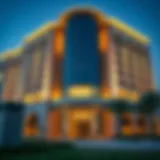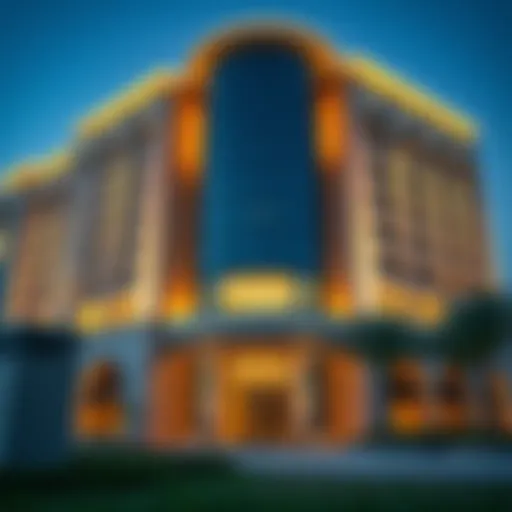Ramadan 2024 in the UAE: Cultural and Economic Insights
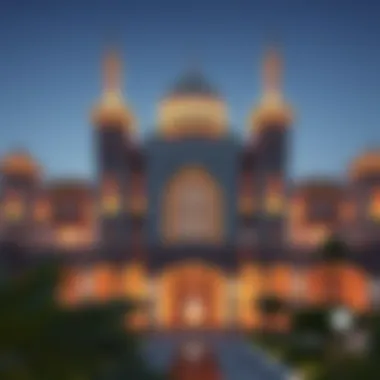

Intro
Ramadan, the ninth month of the Islamic lunar calendar, serves not just as a time for fasting and reflection, but also as a significant driver in shaping cultural, social, and economic landscapes in the United Arab Emirates. As the month of Ramadan approaches in 2024, one cannot help but notice the multitude of changes eagerly anticipated throughout the nation, especially in bustling hubs like Dubai. For expatriates and long-time citizens alike, Ramadan offers a unique opportunity to engage with the community while unlocking potential paths in various sectors, notably real estate.
This article aims to navigate through the depths of Ramadan's impact, using it as a lens to understand broader trends evolving in the UAE. We will explore current shifts in the property market, opportunities for investments, and how the spirit of Ramadan catalyzes community participation and local initiatives.
Market Insights
As the sun sets daily during Ramadan, a more subdued yet vibrant atmosphere fills the streets, leading to altered consumer behaviors and shifting demands in the real estate sector. The arrival of Ramadan often results in noticeable trends that investors and homebuyers should take note of.
Current Trends in Dubai Real Estate
During Ramadan, the dynamics of the real estate market tend to shift as individuals anticipate the needs of families and communities. This holy month encourages short-term rentals, as many expatriates consider vacationing or returning to their countries. Families looking for accommodation prefer leasing properties that are closer to mosques and community centers to facilitate ease of access for Iftar and Taraweeh prayers.
Moreover, there’s a trend of properties offering arrival packages tailored for Ramadan, promoting easing into the month with special rates and amenities such as meal deliveries for Suhoor and Iftar ceremonies. These moves reflect a growing demand for flexibility and comfort during this significant time.
Predicted Market Growth and Future Opportunities
As we look closer to Ramadan 2024, experts anticipate a modest yet positive growth trajectory in the real estate sector. Notably:
- Gated Communities and Villas: High demand for gated living spaces—offering privacy, community engagement, and recreational facilities.
- Retail Spaces: Properties near commercial centers benefiting from increased foot traffic as businesses extend their hours to accommodate late-night shopping.
The implications of these trends suggest that savvy investors should consider both rental and purchase markets, leveraging the community focus that Ramadan instills.
"Understanding the cyclical nature of real estate in alignment with cultural observances can unlock hidden gems for both investors and buyers alike."
Investment Strategies
Navigating the market during Ramadan doesn't have to be a daunting task. With some insight and strategy, potential investors, whether first-timers or seasoned players, can make sound decisions.
Tips for First-Time Buyers
For individuals looking toward purchasing during this period:
- Research Local Needs: Understand which areas are most desirable for families and expatriates.
- Leverage Ramadan Promotions: Some developers may offer incentives during this time, including discounts or flexible payment plans.
- Engagement with Local Agents: Collaborate with real estate agents who understand the unique nuances of Ramadan, as they can offer a wealth of information.
Analyzing High-Potential Investment Areas
Investors should pay special attention to neighborhoods exhibiting growth potential.
- Dubai Marina: A hotspot for expatriates, offering proximity to a variety of eateries and recreational spots.
- Jumeirah Village Circle: Gaining traction with affordable options, yet still catering to the needs of families looking for community-centric living.
For more in-depth insights, check these resources:
- Wikipedia on Ramadan
- Britannica on Ramadan's Cultural Significance
- Community Forums like Reddit for local advice.
Always stay updated with local government and realty sites for up-to-the-minute changes in both residential and commercial real estate dynamics.
Understanding Ramadan: A Cultural Overview
The arrival of Ramadan is not merely a calendar event; it possesses deep cultural resonance, particularly in the context of the United Arab Emirates. This section sheds light on the historical roots and diverse practices surrounding this holy month, which holds significance for both locals and expatriates alike. By delving into these aspects, readers can appreciate the multifaceted implications of Ramadan on social life, economic activities, and community engagements.
Historical Significance of Ramadan
Ramadan's significance goes beyond fasting; it is intertwined with the very fabric of Islamic heritage and identity. This month, the ninth in the Islamic lunar calendar, marks the period when the Qur'an was first revealed to the Prophet Muhammad. Thus, it is a time of reflection, self-improvement, and spiritual growth.
Historically, Ramadan served as a means to foster compassion for those less fortunate, reinforcing the values of empathy, generosity, and altruism. As a result, this period not only strengthens individual faith but also cultivates a sense of community among Muslims. In the UAE, this religious observance resonates with groups from different backgrounds—each contributing their customs, yet uniting under the same purpose.
In the UAE, where desert traditions and modernity collide, Ramadan is a vivid reminder of the power of shared faith and tradition. The historical backdrop of the country, which has rapidly evolved from a collection of fishing villages to a modern metropolis, also echoes through the observance of Ramadan, reflecting both continuity and change.
Diversity of Ramadan Practices in the UAE
In a nation where cultures converge, the practices of Ramadan can vary significantly, influenced by different local customs and expatriate traditions.
In the UAE, residents experience Ramadan through a unique lens. Here are some notable practices:
- Iftar Celebrations: At sunset, the fast is broken with community meals known as iftar, which can be quite lavish, featuring dates, water, and traditional dishes. Hotels and restaurants often host public iftar buffets, attracting both residents and tourists.
- Ghabga Gatherings: Unique to the Gulf region, ghabga refers to late-night meals that often bring families and friends together during Ramadan.
- Charitable Endeavors: The practice of giving to those in need is heightened during this month. Initiatives like food drives and charity events often flourish, demonstrating the cultural importance of charity in Islam.
- Special Prayer Customs: The nightly Taraweeh prayers, held in mosques, feature longer readings from the Qur'an, drawing worshippers eager to connect with their faith.
These diverse practices contribute to the rich tapestry that defines Ramadan in the UAE, enabling a blend of tradition and innovation. The communal and familial spirit of Ramadan reinforces social bonds and enhances understanding among various cultural groups.
The significance of the cultural overview of Ramadan ultimately provides insights into how the month shapes the dynamics of daily life, making it exceedingly relevant to investors, homebuyers, or anyone looking to comprehend the broader cultural landscape in the UAE. Understanding these nuances can significantly inform real estate opportunities and community engagement strategies.
Ramadan 2024: Key Dates and Timings
Understanding the key dates and timings for Ramadan 2024 carries significant weight for both residents and expatriates in the UAE. This holy month not only redefines daily life routines but also shapes the social fabric and economic opportunities within the region. Knowing when to anticipate the start and end of Ramadan, along with the precise timings for daily prayers and fasting, is crucial for various stakeholders. Investors and homebuyers, for instance, need to align their planning to accommodate these timings, while businesses must tailor their operations to meet the unique demands of this period.
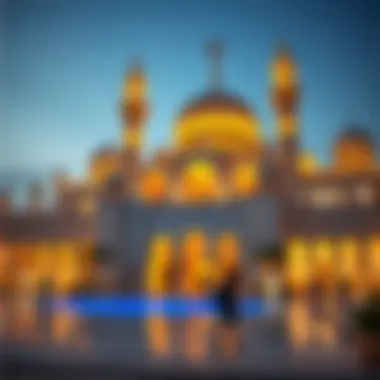

Anticipated Start and End Dates
Ramadan 2024 is projected to commence on the evening of Sunday, March 10, 2024, and conclude on Tuesday, April 9, 2024. However, these dates may vary slightly based on moon sighting, a practice deeply ingrained in Islamic tradition. The UAE traditionally follows the sighting of the moon to mark the beginning of the month. Therefore, to ensure accuracy, it's advisable for communities to stay updated through official announcements from Emirates Islamic authorities.
This month-long observance brings not just spiritual significance but also shifts in daily rhythms. For expatriates and local residents alike, knowing when Ramadan begins and ends enables better planning, whether it's for personal commitments or business strategies.
Daily Prayer and Fasting Timings
The daily routines during Ramadan pivot around prayer and fasting timings, which dictate the day-to-day life of Muslims. Fasting begins at dawn, just before the Fajr prayer, generally around 4:30 AM, and extends until sunset, marked by the Maghrib prayer, which usually occurs at approximately 6:30 PM. These timings might slightly change with the progression of the month, so it's essential to check local prayer timetables frequently.
Gathering for the Iftar meal after sunset becomes a transcendent experience, bringing families and friends together. It's not just about breaking the fast; it's a time for reflection and gratitude amidst the bustling life of Dubai.
Furthermore, aligning business hours to these timings can be a nuanced task. Many offices will likely operate on reduced hours, and certain sectors, like food and beverage, may adjust their opening times to cater to the community's after-sunset needs.
It's crucial for businesses and residents alike to be mindful of the changing schedules, as Ramadan has a ripple effect on everything from productivity to social engagements in Dubai.
Feeling the pulse of these key dates and timings will empower all parties involved to approach Ramadan 2024 not just as a month of fasting and prayer, but as a time filled with potential for connection, growth, and understanding within the community.
Social Dynamics During Ramadan
Understanding how social interactions transform during Ramadan is crucial for grasping the month’s multifaceted implications in the UAE. The period encapsulates not just a time for personal reflection and religious observance, but also a surge of community spirit and engagement. These transformations in social dynamics have repercussions that extend beyond mere interaction, influencing sectors such as real estate and hospitality.
Community Gatherings and Iftar Events
Community gatherings are the heartbeat of Ramadan in the UAE. Each evening, as the sun dips below the horizon, families, friends, and colleagues convene to break the fast together during Iftar. This practice fosters a sense of belonging and unity. For many expatriates, these gatherings provide opportunities to connect with locals and immerse themselves in Arabic tradition.
"The shared experience of Iftar transcends cultural barriers, turning strangers into friends, all under the vibrant UAE skyline."
Iftar events take place in various settings, from large public spaces to intimate family dining rooms. Restaurants often offer special Iftar menus, featuring traditional dishes like dates, lentil soup, and various types of rice and meat. This not only serves the need for sustenance after a long day of fasting but also enhances local tourism, attracting non-Muslims who wish to experience the cultural richness of the month.
The government also plays a role, sponsoring community Iftar events that cater to large groups, including the less fortunate. Such initiatives highlight the spirit of charity and community support that's integral to Ramadan. For business owners, holding Iftar gatherings can be a unique marketing strategy, promoting goodwill and attracting clientele eager to partake in the festivities.
Impact on Family and Social Life
Ramadan significantly reshapes family dynamics and social life in various ways. Evening gatherings often turn into lively sessions filled with discussions, storytelling, and laughter, as families prioritize spending quality time together. This bonding experience is vital, especially in a fast-paced world where individuals often struggle to find time for their loved ones.
The nightly prayers, known as Tarawih, further encourage families to come together, as they often attend these prayers at local mosques. This collective participation reinforces ties within families and the community.
However, the month is not just about unity; it also brings challenges. The flexibility in work hours can disrupt normal family routines, causing both tension and adaptation. Parents may find themselves balancing work commitments with religious and familial obligations, while children often experience a shift in their daily routines, which can lead to behavioral adjustments.
In summary, the social dynamics during Ramadan in the UAE are marked by enriched community connections and varied interactions. Such transformations foster deeper understanding and empathy, laying the foundation for a community that thrives on mutual support and social cohesion.
Economic Ramifications in the UAE
The economic implications of Ramadan in the United Arab Emirates are substantial, intertwining with various facets of daily life, business, and consumer behavior. The arrival of this holy month doesn’t just hold religious significance; it also serves as a catalyst for economic activity across multiple sectors, particularly retail and hospitality. Understanding these ramifications provides insights not only for local citizens but also for expatriates and investors closely observing the market.
Retail and Hospitality Sector Changes
During Ramadan, the retail and hospitality sectors see notable shifts. Shopping habits morph, influenced by both cultural practices and altered schedules. Retailers often anticipate a surge in sales as people prepare for Eid al-Fitr, the festival marking the end of Ramadan. Increased purchasing is prevalent in food items, traditional attire, and gifts. Supermarkets and local markets typically extend their hours, staying open late into the night to accommodate shoppers’ schedules after iftar—the evening meal breaking the fast.
- Promotions and Sales: It’s common for stores across the UAE to design special promotions, giving discounts on popular products.
- Dining Out: The hospitality sector gears up for a significant influx of patrons during iftar. Restaurants offering iftar buffets see increased demand, many of which offer special menus and pricing tailored for families and large gatherings.
- These promotions not only entice consumers but build excitement leading up to Eid.
- Brands successfully utilize social media platforms to advertise these deals, creating buzz in the digital space.
- As a result, reservations often fill up quickly, highlighting the importance of pre-planning.
- Culinary experiences that embrace cultural traditions become key attractions for both residents and tourists alike.
"Ramadan unites people, drawing them to share meals and experiences, readying businesses for a wave of customer engagement."
The hospitality industry must also adapt quickly, considering the sensitive nature of the month concerning fasting. Establishments are tasked to navigate a fine line—maintaining respect for those observing Ramadan while still accommodating the needs of diners and tourists. Specialized training for staff about dietary restrictions and cultural sensitivities is increasingly common.
Real Estate Market Trends During Ramadan
In adding another layer to the economic landscape, the real estate sector often feels the impact of Ramadan. Interestingly, property transactions can fluctuate during this period due to cultural and religious nuances.
- Rental Demand: The month often witnesses an uptick in demand for short-term rentals, particularly as expatriates from different regions converge in the UAE. Many seek accommodations close to places of worship or community spaces, causing landlords to reconsider pricing strategies.
- Investment Opportunities: Investors keen on the market observe trends closely. Certain properties become particularly attractive for expatriates seeking to rent or buy due to seasonal adjustments in pricing and heightened demand.
- Areas like Dubai Marina and Downtown Dubai see heightened activity as these areas are social hubs during the month.
- Additionally, the lead-up to Eid spurs certain buyers to make quick purchases ahead of the holiday rush.
- Many real estate agents leverage this time to promote family-friendly properties that cater to the increased community-oriented spirit of the month.
Recognizing these dynamics is crucial for stakeholders across the board. The synergy of cultural observance and economic activity provides a fluctuating landscape, where understanding consumer behavior is beneficial for making informed decisions in the property sector.
Ramadan and Real Estate: An In-Depth Look
The intersection of Ramadan and the real estate sector in the UAE provides a fascinating perspective on how seasonal changes impact local markets. This holy month is not just about religious observance; it also brings significant shifts in demand and economic dynamics that are vital for investors, homebuyers, and expatriates alike.
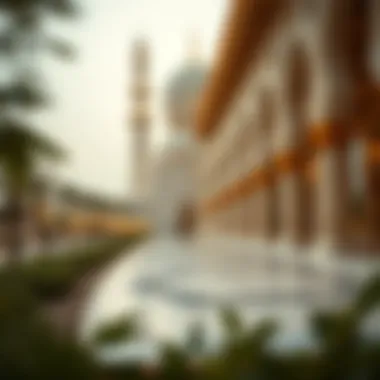

Increased Demand for Rentals and Sales
As the Ramadan month approaches, there’s a notable uptick in demand for both rental properties and homes for sale. Families often plan to welcome relatives and friends during this time, which drives a need for larger living spaces. Typically, newcomers flock to the UAE aiming for a new start aligned with the upcoming Ramadan festivities.
- Family Gatherings: These lead to increased demand for villas and multi-bedroom apartments, particularly in communities known for their festive spirit, like Dubai Marina and Al Barsha.
- Location Preferences: Proximity to mosques and Iftar venues plays a crucial role in decision-making. Properties that are near well-regarded community hubs see a spike in interest as families want to partake in communal celebrations.
- Short-Term Rentals: There’s also a rise in short-term rental requests. Expat families who usually reside abroad may return for this special month and opt for furnished rentals to escape the hustle of hotel living.
It’s not all about sheer numbers either. For property investors, being aware of these trends is essential. Understanding the patterns of demand can lead to timely investments, maximizing returns during the high season.
Impacts on Property Management Companies
Property management companies experience a unique set of challenges and opportunities during Ramadan. Amplified activity in both rentals and renewals shifts their operational focus.
- Increased Workload: There’s often a jump in maintenance requests as families prepare their homes for guests, meaning property managers need to scale up their services to meet tenant expectations.
- Flexibility in Rental Terms: Many landlords show willingness to negotiate rental terms during Ramadan, recognizing the unique market conditions. This means property managers must navigate these discussions delicately to retain tenants while ensuring compliance with regulations.
- Community Engagement Initiatives: Companies may find they can strengthen relationships with tenants through community projects, such as organizing Iftar gatherings or charitable events that enhance tenant experiences while boosting company visibility.
"Engagement is key. During the festivities of Ramadan, property managers have the chance to foster goodwill by supporting community events, which in turn strengthens tenant loyalty and satisfaction."
In summary, the relationship between Ramadan and the real estate market in the UAE is complex and multifaceted, highlighting the importance of adapting strategies to take advantage of changing demands. As we look toward the upcoming month, stakeholders would do well to keep these trends in mind, not only to meet current needs but to enhance future opportunities.
For more about the impacts of Ramadan in the UAE, consider visiting resources like Britannica or Wikipedia.
This synergy between Ramadan and the real estate market underlines the significance of cultural awareness in real estate decisions throughout the UAE.
The Role of Expatriates During Ramadan
The presence of expatriates in the UAE is a mosaic of cultures, traditions, and experiences, enriching the landscape of Ramadan. The month offers a unique opportunity for expatriates to immerse themselves in local customs, fostering a greater sense of belonging while navigating their own cultural identities. Understanding the role of expatriates during this special period is pivotal not only for personal growth but also for the broader community's social fabric. As foreign residents engage with local traditions, they play a vital part in bridging cultural gaps, leading to a more inclusive Ramadan experience for everyone.
Adapting to Local Traditions
Adaptation is a key theme for expatriates in the UAE during Ramadan. For many, the holy month brings about a shift in daily routines, from changes in work hours to the practice of fasting. As expatriates strive to balance personal beliefs with local customs, they might find themselves celebrating Ramadan with a blend of local and cultural traditions.
- Embracing Fasting: Although fasting is primarily observed by Muslims, many expatriates choose to join in to better understand and appreciate the significance of this tradition. Participating in meals that mark the Iftar, the breaking of fast, allows expatriates to experience the communal spirit the month brings.
- Respecting Local Practices: Being part of a multicultural society, it is important for expatriates to respect local norms during Ramadan. This entails being mindful of public behavior, particularly in the presence of those who are fasting. The cultural exchange is highly beneficial; positive and respectful engagement can lead to a deeper understanding and appreciation of Islam.
- Culinary Experiences: Expatriates often explore local cuisines during Ramadan, which can spotlight the ingredients and cooking styles unique to the UAE. Foods like harees or majboos become a topic of interest, merging culinary traditions with personal stories at iftar gatherings.
Community Support and Engagement
During Ramadan, community support becomes a cornerstone for expatriates. The month is synonymous with generosity and compassion, setting the stage for various initiatives aimed at collective well-being. Expatriates contribute significantly to community engagement through various channels:
- Participating in Charities: Many expatriates join or organize charitable events to support local families. From food drives to donations, these activities illustrate the universal values of sharing and resilience. By engaging in these efforts, expatriates not only give back to the community but also embed themselves within it, fostering deeper relationships.
- Cultural Exchange Programs: Many organizations and communities host cultural exchange programs, enabling expatriates to learn about the history and meaning behind Ramadan practices. Such interactive learning experiences pave the way for richer dialogues and encourage cultural tolerance.
- Networking Events: Expatriate communities often organize diverse events during Ramadan that focus on networking and bonding over shared interests, further enhancing the sense of belonging. Engaging in these events can help strengthen professional ties while also making meaningful friendships.
The engagement of expatriates in Ramadan not only serves personal growth but also propels social cohesion in the UAE, nurturing a collective spirit that transcends cultural lines.
In essence, the role of expatriates during Ramadan is not merely about participation; it's about creating a symbiotic relationship with the culture and community they reside in. This rich interaction fosters a sense of unity and respect, laying the groundwork for a cohesive society that embraces diversity.
Business Adaptations in Dubai During Ramadan
As Ramadan approaches in 2024, businesses in Dubai are preparing to adapt to the unique cultural and social dynamics that accompany the holy month. While the core of Ramadan is deeply rooted in spiritual reflection, fasting, and community bonding, the associated changes in business operations can have significant implications for both local companies and expatriate businesses striving to align with the ethos of this time.
Work Hours and Employee Adjustments
The work environment in Dubai undergoes a notable transformation during Ramadan. For instance, many firms, particularly in the public sector, adjust their working hours, often reducing the daily schedule to better accommodate the fasting routine of Muslim employees. This adjustment isn't merely about creating shorter work-days; it’s an acknowledgment of the physical toll fasting can take on workers.
To illustrate, the typical start time may shift from 8 AM to around 9 or 10 AM, with the working day usually finishing around 3 PM. Some organizations even opt for flexible working arrangements that allow employees to complete their tasks in ways that suit their fasting schedule. Employers need to be considerate of their team’s well-being, which not only contributes to overall productivity but also fosters a sense of community and respect for cultural practices.
- Considerations for Businesses:
- Productivity Monitoring: With changes in hours, it’s essential to monitor productivity levels and make necessary adjustments.
- Employee Morale: Maintaining high morale is crucial; practices like social gatherings or team-building events during Iftar can enhance engagement.
Marketing Strategies for Ramadan
The marketing landscape during Ramadan presents both challenges and opportunities. Businesses looking to thrive need to tailor their strategies to resonate with the values and sentiments of the month. This isn't just about special product offers; it's about creating meaningful connections with customers.
One effective strategy that businesses employ is emphasizing community-centric campaigns. Marketing messages often highlight themes of family, sharing, and generosity, aligning with the principles of Ramadan. This can be achieved through:
- Social Media Campaigns: Engaging storytelling that revolves around Ramadan experiences can draw in a wider audience. For example, businesses might share customer stories or testimonials that reflect the spiritual and communal aspects of Ramadan.
- Collaborations with Influencers: Partnering with local influencers who resonate with the cultural fabric of Ramadan can optimize outreach initiatives. They can help provide authenticity and promote engagement by sharing their personal Ramadan journeys.
- Sponsorship of Community Events: Supporting local Iftar traditions or Ramadan festivities positions businesses as key players in the community, demonstrating genuine investment in the cultural practices.
"Businesses that align their messages with the spirit of Ramadan not only enhance brand loyalty but also contribute positively to community sentiment."
Conclusively, adapting to the rhythm of Ramadan is vital for businesses operating in Dubai. Those who embrace the cultural adjustments—be it in work hours or marketing techniques—maximize their potential to connect with consumers and foster a supportive community atmosphere. Understanding these nuances can equip stakeholders with the insight necessary to navigate this pivotal time in the UAE business landscape.
Festivals and Events Unique to Ramadan
The month of Ramadan is not just a period of fasting; it is also a time steeped in rich cultural activities and community-based events. In the UAE, this month provides an opportunity to engage in unique festivals and events that resonate deeply with both local traditions and the diverse expatriate community. The vibrancy of these events contributes significantly to the cultural fabric and social harmony during Ramadan, making them a vital focus in understanding the month’s significance.
Cultural Festivals and Exhibitions
Throughout Ramadan, various cultural festivals and exhibitions spring up across the UAE, showcasing the spirit of togetherness that this holy month embodies. These events often feature local artists, craftsmen, and performers who display their talents in a celebratory atmosphere.


One notable example is the Ramadan Night Market, found in cities like Dubai and Abu Dhabi. This market transforms public spaces into bustling hubs filled with food stalls, cultural exhibits, and entertainment. From traditional Emirati cuisine to contemporary art displays, visitors experience a blend of old and new. A great deal of pride emanates from stalls showcasing handwoven textiles and intricate pottery that anchor the nation’s heritage.
"Cultural festivals during Ramadan serve as a beacon of unity, drawing people from different backgrounds to share in the joy and goodwill of the season."
Additionally, art exhibitions focus on themes of spirituality and reflection, encouraging attendees to introspect and connect with the essence of Ramadan. Attending these festivals not only promotes local artisans but also fosters a sense of community bonding, reinforcing shared values among diverse populations.
Special Events for Families and Children
Ramadan is also filled with a variety of special events tailored for families and children, emphasizing the importance of togetherness and community. Islamic educational workshops are popular—offering kids the chance to learn more about their heritage in a fun and engaging way. Activities might include storytelling sessions that narrate the significance of Ramadan, allowing young ones to grasp its importance while having enjoyable experiences.
Furthermore, many public parks and community centers host iftar gatherings designed specifically for families. These events often include games and amusement activities for children, making the experience not only about sharing meals but also about creating lasting memories.
It's common to find gloriously decorated spaces where families enjoy an evening meal just as the sun sets, often sharing the bounty with those in need. These gatherings truly encapsulate the spirit of giving and sharing that Ramadan encourages.
Finale
In sum, the festivals and events held during Ramadan are far more than seasonal occurrences; they embody the essence of unity, compassion, and joy that permeates the UAE during this sacred month. From cultural exhibitions that nurture local artistry to family-centric activities that forge bonds, these events enrich the Ramadan experience and underscore its broader implications in the community.
As Ramadan 2024 approaches, investors, homebuyers, agents, expatriates, and analysts should note the significant opportunities for engagement, awareness, and understanding this cultural richness presents in Dubai's evolving landscape.
Religious Observances and Practices
Ramadan is much more than just a month of fasting; it encapsulates a rich tapestry of religious observances that resonate deeply within the hearts of Muslims, particularly in the UAE. This period is marked by a heightened sense of spirituality and community, compelling even those who might not strictly adhere to Islamic practices to engage in the festivities. The essence of Ramadan revolves around self-reflection, empathy, and worship, translating into a range of practices that strengthen the communal bonds and facilitate personal growth.
Prayer Gatherings and Their Importance
Prayer is the cornerstone of a Muslim’s relationship with their faith, but during Ramadan, its importance escalates significantly. Muslims are encouraged to perform their prayers with greater frequency and devotion. Known as "Tarawih," these nightly prayers take place after the obligatory night prayer, and are often held in mosques that come alive with worshippers. The atmosphere is electric; the recitation of the Quran can be heard echoing through the walls, creating a sense of unity among congregants.
- Camaraderie: At the heart of these prayer gatherings lies a spirit of togetherness. Families and friends often congregate in mosques, reinforcing social bonds and fostering community spirit.
- Spiritual Growth: Engaging in collective prayers offers the chance for self-reflection and spiritual upliftment. As believers gather under one roof, the shared commitment to faith becomes palpable.
- Elderly and Youth Engagement: It becomes a cherished tradition, where elders can impart knowledge to the youth, helping to nurture a greater understanding and appreciation of their beliefs.
"During Ramadan, I find that the prayers at the mosque serve as both a spiritual refuge and a reminder of our shared commitment to our faith." – An anonymous UAE resident.
These gatherings not only serve religious purposes but also act as social hubs that embrace all ages, thereby bridging generational divides.
Charitable Activities During Ramadan
Charity, or "Zakat," takes on a particular significance during Ramadan. Muslims view this month as an opportunity to engage more fervently in acts of kindness and generosity. The doing of good deeds is seen as a path to spiritual elevation.
- Supporting the Less Fortunate: The essence of giving is amplified as people reach out to the needy, be it through financial donations, food drives, or providing meals for Iftar, the evening meal that breaks their fast. Many UAE residents participate in initiatives that provide food packages to those unable to afford a meal.
- Community Initiatives: Local mosques and humanitarian organizations step up to host events that encourage community involvement. For example, campaigns like "Ramadan Boxes" distribute essential supplies to underprivileged families.
- Sense of Purpose: For expatriates living in the UAE, participating in these charitable activities can foster a sense of belonging and connection to the local community, illuminating the diverse and inclusive fabric of UAE society.
Through these charitable activities, Ramadan not only unites Muslims in their faith but also encourages a collective responsibility towards creating a more equitable society. The engagement in such acts further reinforces the core Islamic teachings about empathy and community service.
Overall, the religious observances and practices during Ramadan in the UAE reflect a unique blend of spirituality, community bonding, and social responsibility, underscoring the importance of this holy month for individuals and communities alike.
End: The Broader Implications of Ramadan in the UAE
The arrival of Ramadan brings a kaleidoscope of impact across the UAE, influencing various facets of life, from culture to the economy. This month of fasting and reflection is not merely a spiritual journey for many, but also a time when societal dynamics shift dramatically. The implications are profound and multifaceted, ultimately shaping how residents and expatriates experience life in this vibrant nation.
Community Cohesion
One of the most significant outcomes of Ramadan is the strengthening of community ties. Iftar meals, shared among families and friends, serve as a cornerstone of this unity. These gatherings often transcend cultural and national boundaries, inviting the diverse population in the UAE to engage in a collective spirit. Emphasizing this, local neighborhoods host public iftars, where everyone can partake, fostering social integration, which is invaluable in an expatriate-rich environment.
"Ramadan offers a unique platform for social connection. These nightly gatherings are more than meals; they are a celebration of togetherness that strengthens our community bonds."
Economic Influence
From the economic standpoint, Ramadan gives rise to unique patterns in consumer behavior. Retail opportunities peak during this month, as businesses tailor their offerings to cater to the heightened demand for food, clothing, and gifts. The hospitality sector, too, experiences a surge, with hotels and restaurants adapting services to meet the needs of both locals and tourists. The strategy to promote special Ramadan packages reflects an astute understanding of this seasonal change, ultimately contributing to the economy's vitality.
As we look to Ramadan 2024, investors should consider these trends carefully. Recognizing shifts in consumer preferences can unlock potential avenues for intriguing investment opportunities.
Real Estate Dynamics
In real estate, the month of Ramadan influences both the rental and sales markets. Properties with easy access to mosques or communal spaces warm the hearts of many during this time. Moreover, as families often look for larger spaces that can accommodate guests, the demand for specific types of homes might escalate. Investors should keenly observe these trends and assess their portfolios accordingly.
Cultural Respect and Adaptation
Another significant consideration is the cultural importance of Ramadan. Both locals and expatriates must navigate this period with a nuanced understanding of its significance. Respecting fasting hours, participating in community gatherings, and engaging in charitable acts reflect an acceptance of local customs. This spirit of mutual respect is essential for fostering a harmonious living environment amidst the cultural plurality found in the UAE.
In summary, the implications of Ramadan stretch far beyond the spiritual. It serves as a dynamic period that shapes social, economic, and cultural landscapes in intricate, interconnected ways. For stakeholders—be it investors, homebuyers, or expatriates—being aware of and responsive to these ramifications will certainly pave the way for fruitful engagement in the UAE throughout this holy month and beyond.
Looking Forward to Ramadan's Influence
The anticipation surrounding Ramadan 2024 highlights the ongoing evolution of cultural practices and business strategies in the UAE. As this holy month approaches, stakeholders across various sectors can strategize based on insights gained from previous years.
- Enhanced Marketing Strategies
- Community Engagement Initiatives
- Cultural Sensitivity in Business Operations
- Companies can capitalize on the atmospheric changes by integrating Ramadan themes in their advertising, underlining the spirit of unity and generosity.
- Investments in community events could be a win-win, enhancing social cohesion while also promoting businesses within the local area.
- Guaranteeing that daily operations respect fasting hours can lead to increased loyalty among consumers.
In summary, the influence of Ramadan is set to continue its ripple effect through 2024. Acknowledging, understanding, and adapting to its implications can bring about significant benefits for all involved.
Relevant Resources:
- Wikipedia on Ramadan
- Britannica on Ramadan Observances
- Cultural Diversity in the UAE
- UAE Government Insights
By harnessing the insights offered by Ramadan, stakeholders can navigate the landscape of the UAE in a manner that respects local customs and fosters economic growth.
